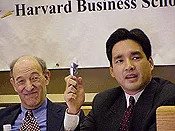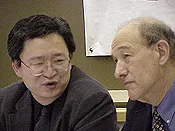In the opening panel of the conference, titled "Japan Towards the 21st Century: How Should Japan Compete?" moderator and Harvard University professor Michael Porter laid a framework for experts from Japanese business, government, and politics to discuss prospects and strategies for Japan's economic recovery.
"It is clear that something is wrong in Japan from an economic point of view," Porter stated, as a means of setting the stage. "The persistent depression, recession, and slowdown just won't quit." He described the Japanese economic landscape, as outlined by himself and coauthors Hirotaka Takeuchi and Mariko Sakakibara in their new book, Can Japan Compete?, before leading a discussion on approaches to Japan's economic recovery. The conversation sparked considerable debate around his own theories on the nature and sources of Japan's economic state.
Japan: Résumé Of An Asian Tiger
"Only 10 to 12 years ago, the Japanese model was celebrated and undeniable," Porter began. "There was almost an hysteria and fear of Japan." He described how the press in the late '80s and early '90s heralded Japan's industrial process as a new form of capitalism superior to the Western model.

Ezra F. Vogel and Yoshito Hori
However, he continued, "We must recognize that there were quite a number of signs that things were not as robust as they seemed," describing what he referred to as "the two Japans." The first was the highly competitive Japan, he said. But an undercurrent throughout the post-war period emphasized a second, noncompetitive Japan, as well, according to Porter.
"Consumer packaged goods, chemicals, agriculture, software, and aircrafts were flat out. That was a danger sign that the Japanese economic approach was not a universal panacea to competing in the global economy."
Porter went on to suggest that even the profitable Japan had serious limitations. "Total quality management, lifetime employment, close relationships with suppliers . . . did work to create a tremendous lead, but the rest of the world caught up. The company model was correct but incomplete. It came up short in creating unique market strategy, unique brand images, and unique value propositions. Competition became a zero-sum game. Everybody was imitating everybody else. Nobody had any unique product."
Porter's stance on Japan's industrial support model of protectionism, cooperative R&D, and relaxed antitrust was almost entirely negative. "What we found [in our research] was that the government model was applied much more vigorously in the failure cases: in chemicals, in software, in aircraft, in agriculture. In the successful industries that we all talk about, it was limited and muted and not the cause of success."
Before opening up the discussion to other panelists, Porter pointed out that much of what had been viewed as the key to success in Japan was not, in his opinion, the key to success—and that mismatch poses a lot of challenges for Japan today. "Unless Japan can come to a consensus on what worked in the past and what didn't, it is pretty hard to create a new economic strategy.
"And it is that model that I hope our colleagues can shed some light on."
Government: Yes Or No?
Shin Yasunobe, a former director within various departments of Japan's Ministry of International Trade and Industry (MITI), and now executive director of Stanford's Japan Center for Research, warned against policymakers' reliance on strong ties to big business.
"If we listen to old existing companies' opinions, they tend to project themselves," remarked Yasunobe. He tried to place the issue in the perspective of a U.S. industrial setting. "If we listened to the leading computer companies in the U.S. in the '70s and '80s, it would be the IBMs, the DECs, and the Burroughs.
"Now who are they? IBM is still there, but Cisco and Microsoft did not exist in the '70s. So if we just listen to the voices of the [major players], the policy implemented is out of date."
Loyalty, concern for the individual, desire for equality—a lot of Japanese still think these are good things. [They] don't want to just throw those out.
—Ezra F. Vogel, Harvard University professor
Yasunobe went on to discuss the changing attitude within the Japanese government towards big business. There is currently a policy battle inside the government, he suggested, about whether Japan should take on competition-oriented policies, or the more traditional policies that protect the strong social traditions of Japanese big business. He recommended watching the reformation of the Japanese telecom monopoly, Nippon Telephone and Telegraph (NTT), over the next two or three years for clues into the developing stance of the government.
Added Ezra F. Vogel, Harvard professor and former director of Harvard's Fairbank Center for East Asian Research, "A lot of deregulation is really reregulation. It is a different kind of regulation that allows more competition."
While Vogel clearly viewed deregulation as the right direction for Japan, he said that in most industries, especially communications and finance, the country is not ready. "There are a lot of politicians who are going to slow down that process," said Vogel.
While Vogel and Yasunobe were less critical than Porter of the Japanese government's role in industry, panelist Yoshito Hori (HBS MBA '91) went far beyond Porter in his call for liberalization.
"I really don't care about the government," Hori declared. "I only expect government to deregulate." Hori, chairman of venture capital firm Globis Group and chairman and CEO of private equity concern Apax Globis Partners & Co., was the only panelist to voice undaunted enthusiasm about a bright future for Japanese industry.
A Role For Business
Hori predicted that mobile communications would become a major industry in Japan. "Wireless Internet is a reality in Japan," he said, speculating that broadband, digital content, and semiconductors will all be controlled by Japan by 2005.
Vogel commented that finance and retail were also promising new pockets of competition for strengthening the business scene. Vogel pointed to technical sectors, such as electronic games, as a sign that "Japan is a lot more creative than it is given credit for."
It was impossible to discuss the role of business in Japan's recovery without discussing the keiretsu system of strong ties, including cross-ownership between companies within industries. Again, Yasunobe and Vogel were more sympathetic than Porter to this less-liberalized system.

Shin Yasunobe and Ezra F. Vogel
Vogel, for instance, offered the point that there were some sectors where keiretsu relationships are helpful, particularly in regards to production techniques. Yasunobe, meanwhile, predicted that some type of keiretsu system would survive and be valuable. "Even in the U.S.," he added, "there are supply chain systems very much like the keiretsu."
As before, Hori came through with the most direct call for liberalization. "Keiretsu are bad," Hori charged. "We should kill them. All keiretsu should be dismantled, and cross-holdings cut."
However, when Vogel commented on Toyota's relationship with suppliers as a valid keiretsu construct, Hori did agree. While Porter stressed the negative impact of cross-ownership, Porter also said that the keiretsu system's unique strength lay in its ability to work across sectors. "We want to maintain that," he said.
Beyond Business
Vogel described a gap in current political leadership that he believes will stall the necessary policy adjustments. "There are almost no politicians in their 60s who are able to provide the necessary leadership and coherence," he told the group. "The bureacrats are good at dealing with things within their sector, but when it requires overall adjustment and strategy in issues like budget change, that has to be done by the politicians. There are some very good, young, bright politicians in their 40s, but you can't expect them to take power and consolidate in a five-year period."
Vogel placed the political goals of recovery in a broader context than economics. He reviewed the tremendous economic boom after the war, but stressed that economics was not the only area of success.
"A lot of the things that Japan has—loyalty, concern for the individual, desire for equality—a lot of Japanese still think these are good things, and I do, too," Vogel said. "Japanese don't want to just throw those out. They don't want to go completely to a Western system."
By the time the panel broke up, it was clear that Japan is in the midst of a classic challenge facing nations in the globalizing world economy—trying to maintain beneficial social traditions, while staying competitive.
Vogel was the most hopeful about Japan's ability to recover, but saw it as a tough job for Japan's policymakers. "It is not clear how you combine the best of their old system with the new," he cautioned.
"That is still going to take a few years to sort out."
For more reading on Professor Porter and his book "Can Japan Compete?", please visit: Can Japan Compete? [ ] [ ]
Photos by Martha Lagace
